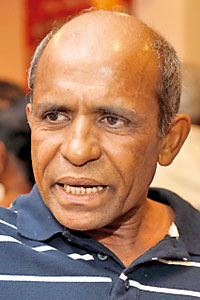Individual care and attention key to success
View(s):Government servant Dusmantha Thotawatte, 58, from Nugegoda had a major life-changing experience six months ago. “I had a heart bypass,” he says, soon after his brisk walk last Sunday, before joining in the marching and dancing, adding that he and his family “asarana vuna” at that time.

Dusmantha Thotawatte
He had heard of Cardiac Rehabilitation in other countries but it was very recently that Sri Lanka ventured into this arena.Dusmantha and many others were ‘graduating’ last Sunday to Phase 3 or Maintenance Phase of the Cardiac Rehabilitation Programme. While Phase 1 had been the treatment in hospital for their cardiac event, Phase 2 which they completed last Sunday was the 6-8 week ‘Outpatient Cardiac Rehabilitation’ which is part of the ‘Health behaviour change and education’ programme.
The ‘Health behaviour change and education’ programme entails:
Lifestyle risk factor management – under which patients are made aware of the high risks posed by smoking, unsafe alcohol consumption, a sedentary lifestyle (lack of exercise) and obesity
Psychological health – having been assessed for psychological problems, patients are provided opportunities for meditation, relaxation, art therapy and music therapy
Medical risk factor management – keeping diabetes, hypertension and dyslipidemia (high cholesterol) levels under control
Cardioprotective therapies – being made aware of cardio-protective drugs and the need to take them according to the doctor’s instructions
The key to the success of the Cardiac Rehabilitation Programme, according to Dr. Sampath Withanawasam, is individualized care and attention.
While the medical goals and benefits include prevention of sudden death, decrease in cardiac morbidity, infarction and graft closure, relief of symptoms such as angina and breathlessness and increase in work capacity; the psychological goals include restoration of self-confidence, relief of anxiety and depression, improved adaptation to stress, restoration of enjoyable sexual activity and relief from anxiety and depression in partners or care-givers.


